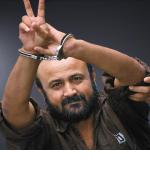Marwan Hasib Ibrahim Barghouti was born in the West Bank village of Kobar in 1962. He is a prominent and popular political figure associated with Fatah, currently serving five life sentences in an Israeli prison. He is a member of the Fatah Central Committee, and of the Palestinian Legislative Council (PLC). Often described by Palestinians as the ‘Palestinian Mandela.’
In the run-up to the First Intifada, Barghouti was a student leader at Bir Zeit University involved in popular protests. He was deported by Israel to Jordan in May 1987 and was only allowed to return to the West Bank in 1993 as part of the Oslo Accords. The following year, in 1994, he became secretary-general of Fatah in the West Bank. During the Second Intifada, he allegedly directed military attacks against Israeli targets. Israel accuses him of having established the al-Aqsa Martyrs Brigades (AMB) at the time.
Barghouti was arrested and sentenced by an Israeli military court in 2002 to five consecutive life sentences for orchestrating attacks on Israelis. Since his imprisonment, Barghouti has been active in the prisoners’ movement and has published various articles from prison to communicate with the outside world. While in prison, he helped draft the 2006 National Conciliation Document of the Prisoners — which he co-signed with Abdulkhaleq al-Natsheh (Hamas), Bassam Sa’adi (PIJ), Abdel Rahim Mallouh (PFLP), and Mustafa Badarneh (DFLP). In 2017, he led a large-scale hunger strike to demand improved rights and conditions for prisoners.
The campaign for Barghouti’s release was launched in 2013 from Nelson Mandela’s cell on Robben Island, in South Africa, where many leaders of the anti-apartheid struggle were imprisoned. Signing the Robben Island declaration calling for Barghouti’s release were eight Nobel Peace Prize laureates, including former U.S. President Jimmy Carter and Desmond Tutu, himself a veteran of the South African campaign.
Picture:

